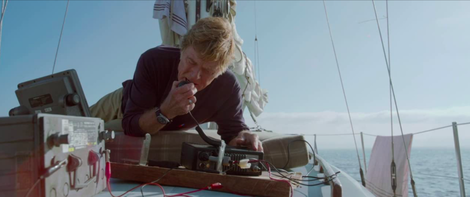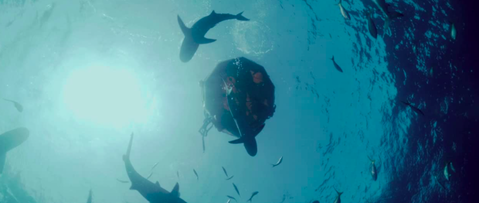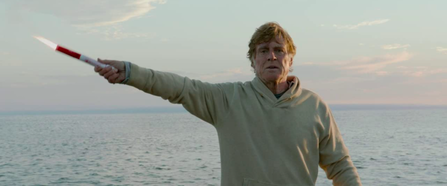
https://www.pluggedin.com/movie-reviews/all-is-lost/
Our Man (Robert Redford): “…I'm sorry. I know that means little at this point, but I am. I tried; I think you would all agree that I tried. To be true, to be strong, to be kind, to love, to be right. But I wasn't. And I know you knew this. In each of your ways. And I am sorry. All is lost here, except for soul and body, that is, what's left of them, and a half day's ration.”
All Is Lost, whilst functioning as an enthralling nautical adventure, is in essence a stripped-down tale of a man in crisis. From the moment the film begins, we’re given little-to-no details in regard to who he actually is – he is nameless, and the purpose for his voyage upon the Indian Ocean is virtually unknown – but we do know that he is “sorry” from a letter he presumably writes to some loved ones, towards the end of the film. Perhaps he left his life behind, as he can’t forgive himself for who he has become to those closest to him? The opening narration certainly suggests that. Maybe it’s unwise though, to try and guess who he is, especially since the screenwriter specifically named him “Our Man” and might therefore be a character who is representational of others. But regardless of his identity or reasoning for wanting to seek solitude on the high seas, Our Man is in trouble: the film opens with him awakening to find water flooding his cabin, following a collision with a wayward shipping container. With supplies dwindling, Our Man must gather his wits and find the strength needed to survive a battle with fearsome, and ever-threatening adversaries: the unpredictability of nature and death itself.
The YouTube community is always an ‘interesting’ place to find oneself, but in watching and then scrolling through the various comments of praise and detraction aimed towards a scene from All Is Lost, I noticed that some viewers had offered numerous, thoughtful interpretations regarding the film’s ending, whilst others simply criticised the film, due to various decisions made by the character that were deemed unwise. Perhaps such decisions were misguided, but if you were to be placed within that self-same situation, would you not make some of ‘mistakes’ yourself? Personally, I didn’t consider Our Man’s actions to be especially foolish overall – he utilises every supply at his disposal, from reading literature on celestial navigation to creatively managing to patch up the hull, thereby ensuring his survival. But time and time again, he comes to find that the hope he places in his own strength & intelligence, or various objects around him, is in fact misguided. Whilst Our Man initially salvages his radio transmitter upon which he places so much hope, it eventually crackles and ceases to transmit. When water fills the cabin, he fashions a makeshift handle for the vessel’s broken bilge pump, but soon finds that there is far too much water for him to remove manually and must accept defeat. Time and time again, Our Man discovers the hard truth that what he believes will promise him security, actually leads him to only experience further insecurity.
So much of the contents and structure of his vessel are finite (food, water) or unstable (the structural integrity of the hull), offering him little to no security which actually dwindles as time goes by. It’s a disheartening experience for the man, and painful for the audience to watch. But such developments of the plot enforce the biblical view that our security and our hope is misplaced, when it isn’t found in God our Father. In 1 Timothy 6:17-19 (NIV), we read that the rich (and all people by extension) who mistakenly put their hope and trust in the things of this world, are encouraged to “put their hope in God” alone, who is a “firm foundation”, that we might “take hold of the life that is truly life” found in relationship with God. To do anything else, the Bible teaches, is to find ourselves bitterly disappointed and, much like our protagonist, completely lost – for the things of this life often fail or disappoint us, whereas God promises that He will never do so.
Time and time again, however, Our Man attempts to prolong and save his life, only to discover that all of his great efforts are made forfeit. He uses fishing wire to catch a fish, but only witnesses it becoming a tasty meal for a passing shark. Even the use of signalling flares to gain the attention of two passing container ships, fails him in the end. For our man, all is truly lost. And in a moment of desperation towards the end of the film, he even tears pages from his journal to create a signal fire, but soon finds that the fire grows out of control and consumes his life raft, leading him to abandon it. Up until this point, we’ve only ever seen Our Man desperately trying to save his life with whatever means are available to him. And such efforts reminded me of the words of Jesus: “If you cling to your life, you will lose it, and if you let your life go, you will save it.” (Luke 17:33, NLT). It’s here, in Luke’s gospel, that Jesus is sharing the hope of the Gospel message once again – noting that if we simply relinquish control over our lives (living life our own way, in our own strength), thereby acknowledging that we are in need of assistance that comes from God alone, we will receive the gift of eternal life with God and be saved from eternal separation from God.
Now, Our Man doesn’t do exactly that – this is, after all, a Hollywood film. But Our Man is seen to relinquish control over his situation and also his life, when he appears to realise that there is nothing he can do in his own strength, to preserve or save it. Instead of frantically trying to grab hold of whatever’s left of his life raft, he just bobs along in the water, and looks intently, up at the sky. It’s as if he’s praying to God and asking him for help, thereby relinquishing his grip upon his life and acknowledging that he is in need of a saviour. And the Bible teaches that we, like Our Man, are all in need of a saviour – that our life is much like his sinking vessel, but has instead been pierced by sin, and is rapidly filling with darkness which will claim our very souls. Writing in Romans, the Apostle Paul reflected upon this when he wrote that “No one is righteous – not even one”, for “no one is seeking God” and “all have turned away” (Romans 3:10-13, NLT). Therefore, according to God, “everyone has sinned” and “…we all fall short of (His) glorious standard” (Romans 3:23, NLT), which cannot be reversed in our own strength – no matter what we do. No, we need a saviour because of the grave effect sin has on our lives: “The payment for sin is death” in eternity, for the wrongdoing we have committed against God (Romans 6:23, ICB).
In the end, Our Man begins to sink to the depths below, believing that there is nothing more he can do or cling to, in order to save his life. And that is true. But then along comes the rescue – a boat with a search light approaches his burning raft, which prompts him to swim towards the surface and grasp an outstretched hand, which then pulls him out of the depths, and into the light. It’s a perfect picture of what God has done for a world that is in desperate need of a saviour to pull them from the depths of their sin. For over 2000 years ago, He sent His One and only Son Jesus to take the weight of our mistakes upon Himself and destroy their power forever, through His death and resurrection (2 Corinthians 5:21). In that moment, he made a way for us to be united in relationship with our Father in Heaven both now, and in eternity, by reaching out His hand of salvation to us. Like Our Man, however, we must grasp that outstretched hand, turning away from our old, sinful lives and toward God – for without Him, we simply exist “in this world without hope” (Ephesians 2:12, GNT) and all – eternally speaking – is truly lost. Yet, if we accept the offer of “His grace”, we will be “put right with God”, pulled out from our depths of sin, and receive “possession of the eternal life we hope for” (Titus 3:7, GNT). With Jesus then, all is never lost.
Challenge:
Why not prayerfully invite a friend or family member who doesn’t yet know Jesus, to watch All Is Lost for themselves? Use the film’s themes to ask them what they thought of the film, if they spotted any links to Christianity and what they might think of the Gospel’s response to this subject.
If you feel able to, ask them what they think about the film’s view of Our Man, and his efforts to save himself. Was he right to do everything in his own power to save himself, or should he have done something else to ensure his survival? What would they have done if they were in Our Man’s position – pray, fall into despair or something else? Ask them to think about Our Man’s desperation to save himself from death, as well – do they think about preserving their life, and if so, how would they seek to do that? Go on to point out that it’s not Our Man’s efforts that save him, but the efforts of someone else entirely. But how do they interpret that scene – was Our Man saved from death by someone human, or perhaps by God himself? Then discuss with them the need for humanity to be saved from their own sinful depths, asking if they see their own need to be saved. Whether yes or no, ask why.
Take the opportunity to share the hope of the Gospel message with them, encouraging them in the knowledge that even though we are all sinking because of the weight of sin in our lives, we can be saved by an outstretched hand from above – the hand of Jesus, who offers salvation to all who call upon Him. So, why not invite them to receive Him for themselves, today?
Prior to watching the film for yourself, however, take a moment to pray that God would speak to you through the show. If you feel comfortable, pray this prayer over all of your future, film-watching experiences:
Dear Lord, as I watch this film, I ask that you would be present here with me. Highlight to me anything within it that is honourable, anything that can be used in conversation for your Kingdom purposes. Amen.
All Is Lost is currently available to stream on Amazon Prime Video (U.K.)




 RSS Feed
RSS Feed